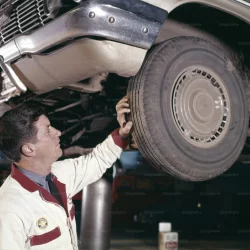Pros and Cons of Car Dealer In-House Financing: Is It the Right Choice for You?

Buying a car is a significant financial decision, and understanding your financing options is crucial. One option many car buyers consider is in-house financing offered by car dealerships. In this guide, we'll explore the pros and cons of car dealer in-house financing, helping you decide if it's the right choice for you.
What is Car Dealer In-House Financing?
Car dealer in-house financing, also known as "buy here, pay here" financing, is when the dealership itself provides the financing for your car purchase. Unlike traditional financing, where you get a loan from a bank or credit union, in-house financing means you borrow directly from the dealership.
How It Differs from Traditional Bank Loans and Third-Party Financing
In traditional financing, you typically apply for a loan through a bank, credit union, or online lender. These financial institutions assess your creditworthiness and offer a loan based on their criteria. With in-house financing, the dealership acts as the lender, offering loans directly to customers, often with more flexible terms.
Advantages of In-House Financing
In-house financing can be advantageous for many car buyers, particularly those who may face challenges securing a loan from traditional lenders.
Simplified Application Process
One of the primary benefits of in-house financing is the simplified application process. Since the dealership handles everything in-house, the process is often quicker and more streamlined. You can complete the financing application at the dealership and receive a decision on the same day.
Flexible Credit Requirements
Dealerships offering in-house financing are often more lenient with credit requirements compared to banks or credit unions. This can be a significant advantage for buyers with poor credit or no credit history. Dealerships are more willing to work with you to create a financing plan that fits your situation.
Convenience of One-Stop Shopping
In-house financing allows you to handle everything in one place. You can choose your vehicle, apply for financing, and complete the purchase all at the dealership. This convenience can save you time and make the car-buying process less stressful.
Disadvantages of In-House Financing
While in-house financing has its benefits, it's essential to consider the potential downsides.
Higher Interest Rates
One of the most significant drawbacks of in-house financing is the typically higher interest rates. Dealerships often charge more for financing to offset the increased risk they take on by lending to buyers with lower credit scores. This can result in higher monthly payments and more interest paid over the life of the loan.
Potential for Limited Vehicle Selection
Dealerships may limit the selection of vehicles available for in-house financing. They might prefer to finance specific models or used cars that they can offer at lower prices. This limitation can restrict your choices and prevent you from getting the car you truly want.
Risk of Predatory Lending Practices
Some dealerships may engage in predatory lending practices, such as offering loans with unfavorable terms or hidden fees. It's crucial to read the fine print and understand the terms of your loan to avoid falling victim to these practices. Always ensure that the dealership is reputable and transparent in their dealings.
Who Can Benefit from In-House Financing?
In-house financing can be beneficial for certain types of buyers and situations.
Profiles of Typical Customers
- Buyers with Poor Credit: If you have a low credit score or no credit history, traditional lenders may deny your loan application. In-house financing can be a viable alternative, offering you the chance to purchase a car and rebuild your credit.
- First-Time Buyers: First-time car buyers who may not have established credit can find in-house financing a more accessible option.
- Those in Urgent Need: If you need a car quickly and don't have time to wait for a traditional loan approval, in-house financing can expedite the process.
Situations Where In-House Financing Might Be Advantageous
- Short-Term Financial Needs: If you only need a short-term loan and plan to pay it off quickly, the higher interest rates of in-house financing might be less of a concern.
- Building Credit: Making regular, on-time payments on an in-house loan can help improve your credit score, making it easier to secure better financing options in the future.
How to Evaluate In-House Financing Offers
Before accepting an in-house financing offer, it's crucial to evaluate it carefully to ensure it's the best option for you.
Tips for Comparing Offers and Reading the Fine Print
- Compare Interest Rates: Even though in-house financing rates tend to be higher, compare offers from different dealerships to find the most competitive rate.
- Check Loan Terms: Understand the length of the loan, monthly payment amounts, and any penalties for early repayment.
- Look for Hidden Fees: Be aware of any additional fees, such as origination fees, late payment fees, or prepayment penalties.
Questions to Ask the Dealer
- What is the interest rate?
- Are there any hidden fees or charges?
- What happens if I miss a payment?
- Can I pay off the loan early without penalties?
Importance of Understanding the Total Cost of the Loan
Calculate the total cost of the loan, including interest and fees, to understand the full financial impact. This will help you determine if in-house financing is truly affordable and within your budget.
Alternatives to In-House Financing
If in-house financing doesn't seem like the best fit, there are several alternatives to consider.
Traditional Bank Loans
Banks and credit unions offer car loans with typically lower interest rates than in-house financing. They often have stricter credit requirements, but if you qualify, this can be a more cost-effective option.
Credit Union Financing
Credit unions are member-owned financial institutions that often offer competitive loan rates and more personalized service. If you’re a member of a credit union, this could be a viable alternative to in-house financing.
Online Lenders
Online lenders provide another alternative, often with quick approval processes and competitive rates. Research various online lenders to find one that offers favorable terms for your credit situation.
Real-Life Stories and Testimonials
Hearing from others who have used in-house financing can provide valuable insights and help you make an informed decision.
Experiences from Buyers Who Used In-House Financing
- Case Study 1: John, a first-time buyer with no credit history, opted for in-house financing at a local dealership. He appreciated the convenience and was able to purchase a reliable used car. However, he noted the higher interest rate and made sure to pay off the loan quickly to minimize interest costs.
- Case Study 2: Maria, who had a poor credit score due to past financial struggles, found in-house financing to be her only option. While the process was straightforward, she carefully reviewed the loan terms to avoid any hidden fees. By making consistent payments, she improved her credit score and refinanced her loan at a lower rate after a year.
Lessons Learned and Advice for Future Buyers
- Do Your Research: Thoroughly research the dealership and read reviews from other customers to ensure they are reputable.
- Understand the Terms: Take the time to read and understand all loan documents before signing.
- Budget Wisely: Make sure the monthly payments fit within your budget to avoid financial strain.
Conclusion
Car dealer in-house financing can be a convenient and accessible option for many car buyers, particularly those with poor credit or in need of a quick solution. However, it's essential to weigh the pros and cons carefully, compare offers, and understand the total cost of the loan. By doing your homework and making informed decisions, you can find the best financing option for your needs and drive away with confidence.
More to Read:
Previous Posts:





